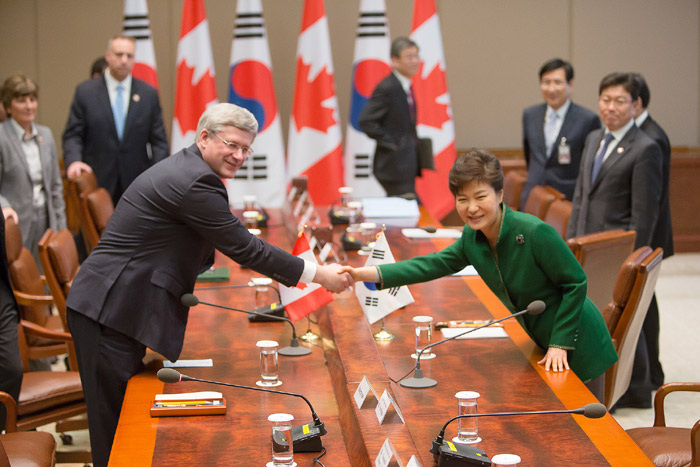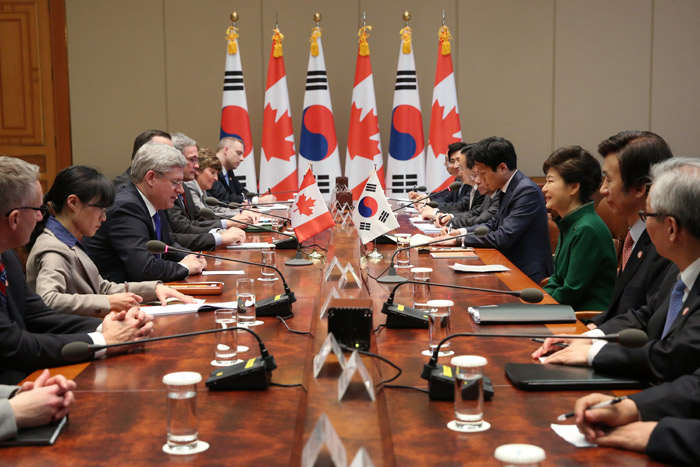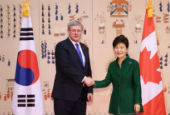Korea and Canada have concluded their free trade negotiations, President Park Geun-hye and Canadian Prime Minister Stephen Harper announced in a joint statement on March 11. After eight years and eight months of free trade agreement (FTA) talks, Canada agreed to gradually lift tariffs on Korean automobiles and electronic goods while Korea said it will reduce duties on Canadian beef and pork.
Korea is the first Asian nation to conclude a trade pact with Canada. Once the deal is officially signed, Canada will become the 12th nation with which Korea has inked a free trade deal. After the two sides sign the agreement and the National Assembly and the Canadian Parliament ratify the pact, it is expected to take effect next year.


The two sides agreed to gradually phase out tariffs every year on most goods, to be completed within 10 years of the agreement going into effect. Under the agreement, the two will eliminate tariffs on 97.5 percent of their imports, in terms of number of items, while Korea will get rid of duties on 98.7 percent of its imports from Canada in monetary value. Canada will remove tariffs on 98.4 percent of its imports from Korea.
Canada will start to progressively abolish the 6.1 percent duty on Korean cars as of the effective date and completely remove the tariff within two years. Automobile exports account for the biggest portion of Korea’s exports to Canada, making up 42.8 percent (USD 2.23 billion) of the total last year.
The 6 percent tax on Korean auto components and the 6 to 8 percent duty on electronics, including refrigerators and washing machines, will be abolished immediately or within three years. A total of 211 items, including rice, powdered milk and cheese, are excluded from tariff cuts. The 40 percent duty imposed on Canadian beef will be phased out within 15 years while the 22.5 to 25 percent tax on pork will be abolished within five to 13 years.
The origin of meats, excluding poultry, will be the country where the animals are slaughtered, as with the FTA between Korea and the U.S. The two sides also agreed to establish an offshore manufacturing committee to discuss whether goods produced in the Kaesong (Gaeseong) Industrial Complex in North Korea can be considered South Korean-made.
The two countries concurred to introduce bilateral safeguards designed to protect any industry in either country that faces a significant risk or damage due to increasing imports from the other country. Finally, they agreed to adopt an investor-state dispute settlement (ISD) clause that allows foreign investors the right to initiate dispute proceedings under international law.
By Wi Tack-whan, Limb Jae-un
Korea.net staff writers
whan23@korea.kr

Korea is the first Asian nation to conclude a trade pact with Canada. Once the deal is officially signed, Canada will become the 12th nation with which Korea has inked a free trade deal. After the two sides sign the agreement and the National Assembly and the Canadian Parliament ratify the pact, it is expected to take effect next year.

President Park Geun-hye (right) and Canadian Prime Minister Stephen Harper shake hands before their bilateral summit on March 11. (photo: Cheong Wa Dae)

The two leaders announced that the two sides concluded FTA negotiations after over eight years of talks. The FTA will lift tariffs on most goods within 10 years. (photo: Cheong Wa Dae)
The two sides agreed to gradually phase out tariffs every year on most goods, to be completed within 10 years of the agreement going into effect. Under the agreement, the two will eliminate tariffs on 97.5 percent of their imports, in terms of number of items, while Korea will get rid of duties on 98.7 percent of its imports from Canada in monetary value. Canada will remove tariffs on 98.4 percent of its imports from Korea.
Canada will start to progressively abolish the 6.1 percent duty on Korean cars as of the effective date and completely remove the tariff within two years. Automobile exports account for the biggest portion of Korea’s exports to Canada, making up 42.8 percent (USD 2.23 billion) of the total last year.
The 6 percent tax on Korean auto components and the 6 to 8 percent duty on electronics, including refrigerators and washing machines, will be abolished immediately or within three years. A total of 211 items, including rice, powdered milk and cheese, are excluded from tariff cuts. The 40 percent duty imposed on Canadian beef will be phased out within 15 years while the 22.5 to 25 percent tax on pork will be abolished within five to 13 years.
The origin of meats, excluding poultry, will be the country where the animals are slaughtered, as with the FTA between Korea and the U.S. The two sides also agreed to establish an offshore manufacturing committee to discuss whether goods produced in the Kaesong (Gaeseong) Industrial Complex in North Korea can be considered South Korean-made.
The two countries concurred to introduce bilateral safeguards designed to protect any industry in either country that faces a significant risk or damage due to increasing imports from the other country. Finally, they agreed to adopt an investor-state dispute settlement (ISD) clause that allows foreign investors the right to initiate dispute proceedings under international law.
By Wi Tack-whan, Limb Jae-un
Korea.net staff writers
whan23@korea.kr

